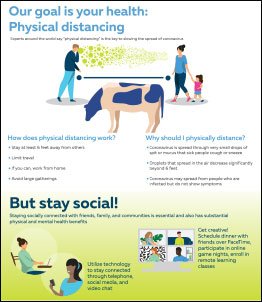What UNC Health Patients Need to Know
Is UNC Health Prepared?
UNC Health facilities maintain readiness for situations such as the one we currently face. Additionally, we have formed a COVID-19 Response Group comprised of senior leaders and medical experts from across our health system. This group is leading our efforts to meet the Coronavirus (COVID-19) challenge.
Slowing the Spread with Physical Distancing
Physical distancing, also called social distancing, is still an important part of avoiding being infected with coronavirus (COVID-19) and slowing the spread of the virus to others.
 It is also important to remember that it is possible to be infected and not have any symptoms, making physical distancing especially important for not spreading the virus to others.
It is also important to remember that it is possible to be infected and not have any symptoms, making physical distancing especially important for not spreading the virus to others.
The Centers for Disease Control and Prevention (CDC) describes physical distancing as "keeping space between yourself and others outside of your home." To follow the CDC guidance on physical distancing:
- Stay at least 6 feet (2 meters) from other people
- Do not gather in groups
- Stay out of crowded places and avoid mass gatherings
Health Talk: 3 Tips for Staying Connected while Physical Distancing
UNC’s Medical Director of Outreach and Support Intervention Services (OASIS), Diana Perkins, MD, MPH, offers suggestions for how to maintain important social connections while following the guidelines for physical distancing during the coronavirus (COVID-19) outbreak. Read this article and more from UNC Health Talk.
What to Do if You have Symptoms of Coronavirus (COVID-19)
"About 80% of patients with COVID have mild to moderate disease, and can be managed at home."
-David J. Weber, MD, MPH, Medical Director of Infection Prevention at UNC Hospitals
Our priority is to reduce the spread of coronavirus (COVID-19) and ensure care for those who have severe symptoms and may need to be hospitalized. Most patients with coronavirus have mild to moderate symptoms and can manage their symptoms at home, indoors. People with coronavirus should isolate themselves from others in their home.
If you are sick, take actions to keep others well and reduce spreading the virus:
- Stay home from work, school, and other public places.
- Physically separate yourself from other people in your home.
- Cover your coughs and sneezes.
- Wash your hands frequently with soap and water.
- Avoid sharing household items like towels, dishes, and utensils.
- Clean all high-touch surfaces like counter tops and handles, every day.
If you have shortness of breath or a cough that is not related to seasonal allergies (read more about allergy symptoms), call your doctor’s office. They can help you decide what to do.
Call your doctor before visiting the office or an urgent care location. If you are having difficulty breathing, call 911 or seek immediate treatment.
Learn more about COVID-19 testing and screening.
Coronavirus (COVID-19) Treatment
- Treatment for mild cases is to stay home and treat symptoms. About 80% of patients with COVID have mild to moderate disease, and can be managed at home.
- The importance of knowing if you test positive with COVID-19 is to stay home and to slow the spread, as the elderly and those with compromised immune systems are the most at risk.